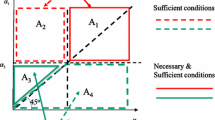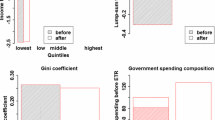Abstract
Recent literature has investigated whether the welfare gains from environmental taxation are larger or smaller in a second-best setting than in a first-best setting. This question has mainly been addressed indirectly, by asking whether the second-best optimal environmental tax is higher or lower than the first-best Pigouvian rate. Even this indirect question has itself been approached indirectly, comparing the second-best optimal environmental tax to a proxy for its first-best value, marginal social damage (MSD). On closer examination, however, MSD becomes ambiguously defined and variable in a second-best setting making it an unreliable proxy for the Pigouvian rate. Given these observations, the current analysis reevaluates these welfare questions and finds that when compared directly to its first-best value, the second-best optimal environmental tax generally rises with increased revenue requirements. Even in cases where the second-best environmental tax is lower than its first-best value, the welfare gains may be greater than in a first-best setting. These results suggest that the marginal fiscal benefit (revenue recycling effect) exceeds the marginal fiscal cost (tax base effect) over a range of environmental tax rates that, for benchmark models, extends above the first-best Pigouvian rate. These findings reinforce the intuition that environmental policy complements rather than competes with the provision of other public goods.
Similar content being viewed by others
References
Auerbach AJ, Hines JR Jr (2002) Taxation and economic efficiency. In: Auerbach AJ, Feldstein M (eds) Handbook of public economics, vol 3. Elsevier, Amsterdam
Boadway R, Tremblay J (2008) Pigouvian taxation in a Ramsey world. Asia Pac J Account Econ 15(3): 183–204
Bovenberg AL, de Mooij RA (1994) Environmental levies and distortionary taxation. Am Econ Rev 94(4): 1085–1089
Bovenberg AL, Goulder LH (1996) Optimal environmental taxation in the presence of other taxes: general equilibrium analysis. Am Econ Rev 86(4): 985–1000
Bovenberg AL, Goulder LH (2002) Environmental taxation and regulation. In: Auerbach AJ, Feldstein M (eds) Handbook of public economics, vol 3, pp 1471–1545
Bovenberg AL, van der Ploeg F (1994) Environmental policy, public finance and the labour market in a second-best world. J Public Econ 55(3): 349–390
Browning EK (1987) On the marginal welfare cost of taxation. Am Econ Rev 77(1): 11–23
Cremer H, Gahvari F (2001) Second-best taxation of emissions and polluting goods. J Public Econ 80(2): 169–197
Cremer H, Gahvari F, Ladoux N (1998) Externalities and optimal taxation. J Public Econ 70(3): 343–364
Diamond PA (1985) A many-person Ramsey tax rule. J Public Econ 4(4): 335–342
Fullerton D (1997) Environmental levies and distortionary taxation: comment. Am Econ Rev 87(1): 245–251
Goulder LH, Parry IW, Williams RC III, Burtraw D (1999) The cost-effectiveness of alternative instruments for environmental protection in a second-best setting. J Public Econ 72(3): 329–360
Howarth RB (2005) The present value criterion and environmental taxation: the sub-optimality of first-best decision rules. Land Econ 81(3): 321–336
Jaeger WK (2002) Carbon taxation when climate affects productivity. Land Econ 78(3): 354–367
Jaeger WK (2004) Optimal environmental taxation from society’s perspective. Am J Agric Econ 86(3): 805–812
Lee DR, Misiolek WS (1986) Substituting pollution taxation for general taxation: some implications for efficiency in pollution taxation. J Environ Econ Manag 13(4): 228–247
Orosel GO, Schöb R (1996) Internalizing externalities in second-best tax systems. Public Finance 51: 242–257
Parry IWH (1995) Pollution taxes and revenue recycling. J Environ Econ Manag 29(3): 564–577
Parry IWH, Bento A (2002) Revenue recycling and the welfare effects of road pricing. Scand J Econ 103: 645–671
Parry IWH, Oates WE (2000) Policy analysis in the presence of distorting taxes. J Policy Anal Manag 19(4): 603–613
Pearce D (1991) The role of carbon taxes in adjusting to global warming. Econ J 101: 938–948
Ramsey FP (1927) A contribution to the theory of taxation. Econ J 37: 47–61
Sandmo A (1975) Optimal taxation in the presence of externalities. Swed J Econ 77(1): 86–98
Sandmo A, Dreze JH (1971) Discount rates for public investment in closed and open economies. Economica 38(152): 395–412
Schöb R (1996) Evaluating tax reforms in the presence of externalities. Oxford Econ Papers 48(4): 537–555
Schwartz J, Repetto R (2000) Nonseparable utility and the double dividend debate: reconsidering the tax-interaction effect. Environ Resour Econ 15: 149–157
Terkla D (1984) The efficiency value of effluent tax revenues. J Environ Econ Manag 11(2): 107–123
Tullock G (1967) Excess benefit. Water Resour Res 3(2): 643–644
van der Ploeg F, Bovenberg AL (1994) Environmental policy, public goods and the marginal cost of public funds. Econ J 104: 444–454
Viscusi WK (1993) The value of risks to life and health. J Econ Lit 31(4): 1912–1946
Williams RC III (2001) Tax normalizations, the marginal cost of funds, and optimal environmental taxes. Econ Lett 71: 137–142
Williams RC III (2002) Environmental tax interactions when pollution affects health or productivity. J Environ Econ Manag 44(2): 261–270
Author information
Authors and Affiliations
Corresponding author
Rights and permissions
About this article
Cite this article
Jaeger, W.K. The Welfare Effects of Environmental Taxation. Environ Resource Econ 49, 101–119 (2011). https://doi.org/10.1007/s10640-010-9426-x
Accepted:
Published:
Issue Date:
DOI: https://doi.org/10.1007/s10640-010-9426-x




